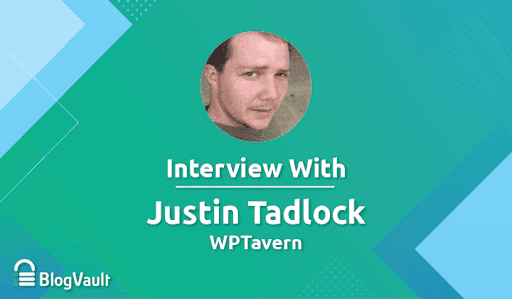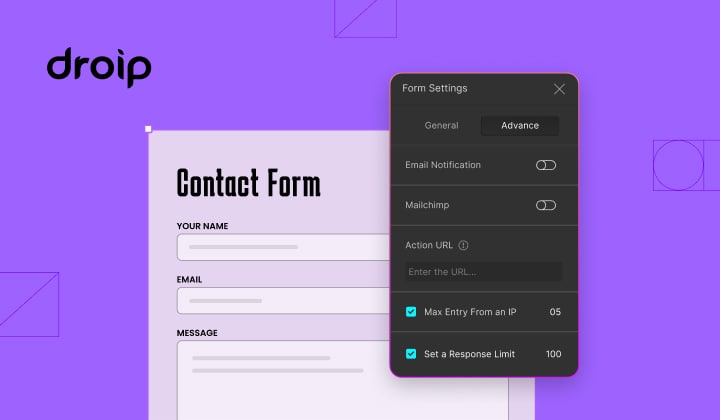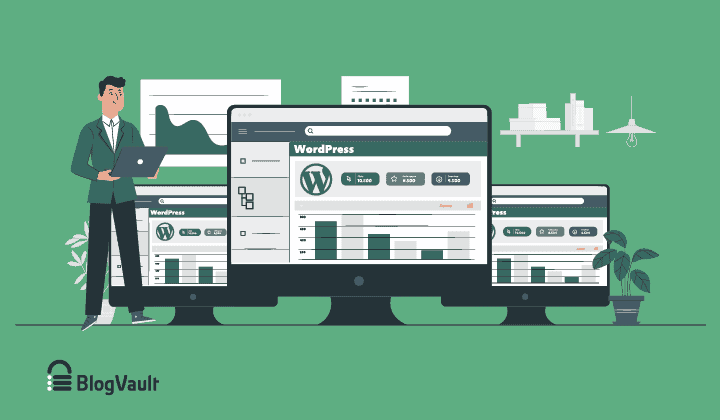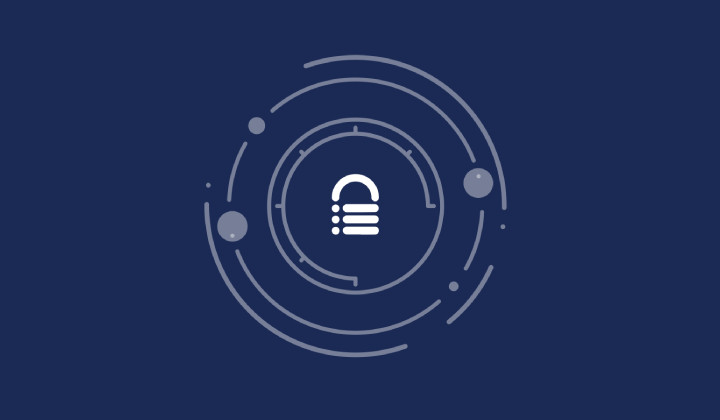Conversation With The WordPress Dev About The Future Of WordPress
Bulletproof Backups for Your WordPress Website
Fortify your business continuity with foolproof WordPress backups. No data loss, no downtime — just secure, seamless operation.

Earlier this year, we got a chance to speak with the enigmatic Justin Tadlock, a popular voice within the WordPress community, about his experiences working with the popular CMS. Let’s jump into the interview.
The Interview
Hello Justin, thanks for taking the time to chat with us today. You’ve been involved in the WordPress space for many years now. You’re the owner of Theme Hybrid and also write for one of the most popular WordPress websites online; WordPress Tavern. Why don’t you kick things off by telling us – what inspired you to get involved in the WordPress community in the first place?
I never originally intended to be involved in the WordPress community. My first love is writing. While in college, I was learning basic HTML, CSS, and PHP to just get a basic website up and running. I needed a way to share my thoughts with the world and anything I was writing at the time. I tried and didn’t like WordPress early on. This was 2005. I tried some other systems like PHP Nuke. Eventually, I came back to WordPress because it was better than anything else I could find.
Not many great themes existed back then, so I needed to learn more about how WordPress worked to make my theme do what I wanted. And, my journey with WordPress from that point forward was primarily about solving my problems for my personal blog.
That’s how quite a few people get started in the WordPress community isn’t it? Now, let’s talk more about your history as a developer. You mentioned that you started building things for yourself, but you took it way further than that. At what point did you realize that you wanted to develop themes and plugins for WordPress in a more professional capacity?
Not long after learning the basics of themes, I started sharing what I was building from my blog. It turned out that other people liked some of the stuff I was doing. I became what one of my friends called “internet famous,” at least within the realm of WordPress. I released a few more themes and a couple of plugins. Some of them became instant hits.
After graduating college and taking a job teaching English as a second language in Korea, I decided to spend a year putting in the groundwork for a theme club. I took on a few clients. I wrote tutorials to teach others what I was learning.
I was a teacher by day and a developer/blogger by night. During my last month on contract as a teacher, I launched Theme Hybrid. I made around $900 that first month. It wasn’t enough to pay the bills, but it was a solid start. The business grew from there.
Mostly, I simply enjoyed building things. There wasn’t one particular catalyst for my decision. It was a journey.
That’s a great start by any standards! You’ve been working on Theme Hybrid since 2008, which is more than a decade already. What motivates you each day to wake up and continue developing apps for the platform?
Theme Hybrid is no longer my job since I began working full time at WordPress Tavern. Therefore, the day-to-day stuff is different now.
However, for the 11 years I was working at Theme Hybrid, I’m not sure what always kept me going. Some of it was stubbornness and an unwillingness to let go during the bad times. Some of it was simply disliking the idea of getting a traditional 9-to-5 job. The rest of it was that I always had some new idea I wanted to try out. Even today, I have a ton of plugin and theme ideas.
The community at Theme Hybrid was always great. In 11 years, I think I only banned maybe five or six people. It was a good, non-toxic atmosphere where folks just shared knowledge and helped each other out.
When you first launched Theme Hybrid, what strategies did you use to onboard your first customers? $900 in your first month isn’t bad!
I had no strategy at all. Seriously, I came into the business during the heyday of WordPress theme shops. In the 2008 era, all you had to do was build something and the people would come. The market was wide open for anyone’s taking.
I was in my early 20s and had no clue about running a business. While I consider myself a great developer, I was just plain lucky on the business end of things.
WordPress is used to power websites ranging from small blogs to enterprise portals. Unfortunately, popularity is a double edged sword. Malicious, web-based attacks against the platform have grown significantly over the years. This of course is part of the reason why we developed a security plugin!
As a WordPress developer, how do you ensure that your plugins and themes remain as tight-sealed as possible against threats? What steps do you take to address vulnerability concerns?
Just tackle the basics. Security doesn’t have to be this complex thing. At the end of the day, always sanitize/validate data on input and escape data on output. WordPress provides the tools. Developers simply need to use them.
When you do find a security vulnerability (and all software developers will need to fix security issues at some point in their career), be proactive about correcting the issue.
Since the release of WordPress 3.7, the platform now has the ability to start automatic security updates on plugins that have been deemed vulnerable. Numerous websites have benefited from this automation either by opting through filters or other remote management means. Has this security automation been helpful to you as a developer?
I don’t think this has necessarily helped me directly. I always build against the latest version of WordPress. I don’t intentionally support anything older than one major version back. As part of the terms of Theme Hybrid, I always made it clear that users were expected to run the most updated version of WordPress. So, I’ve been pushing my plugin/theme users to stay updated since 2008. I like to think that has kept security issues to a minimum for many users.
Gutenberg was made the default block editor from WordPress 5.0 onwards. It is said to make things easier for first-timers, website builders and expert coders. What do you think of this change and how does it affect your work on the CMS? Do you prefer the new or the old editor, and why?
The majority of relatively new users I’ve trained or worked with on the block editor love it. For users who have been with WordPress for a while, it’s been a toss-up.
Personally, I’ve been writing in Markdown for years and transferring to the editor via one Markdown plugin or another. With the new block editor, pasting from Markdown is now a breeze. As for using the block editor directly, I do that sometimes, particularly when building out pages or other non-blog content.
In general, I enjoy the block editor far more than the classic editor. However, I’ve never really used the classic editor much. From my perspective, the bar was set pretty low.
With so many years working with WordPress under your belt, what do you believe the future looks like for the Content Management System? Are there any disruptive technologies on the horizon we should be worried about?
I don’t have a good track record with predicting the future. But, WordPress’ near future is going to move toward putting full control of the site into the hands of users. The Gutenberg project will have things like block patterns, full-site editing, and similar tools that provide more flexibility for users.
There will always be some technology just around the corner to challenge WordPress. However, the future will be about working with those technologies. For example, a lot of developers are focused on various front-end systems while using WordPress as the backend. We will probably see a ton of growth in that area in the next couple of years. As long as WordPress can keep up in that area, it should be safe for a while.
I think those are some easy bets. The biggest disruptors could come from a leap forward in computer technology. The virtual reality world is something to keep an eye on. The mobile markets are always set to drive change. Honestly, I’m just along for the ride.
Lastly, if you were to give three pieces of advice to someone who was just starting out developing themes or plugins for WordPress what would that advice be?
First and foremost, build things that you are passionate about. The toughest times I had over the years were when I was trying to build against the market. The best times I had were when I was building things that I was truly passionate about.
Second, build to solve problems. If your software isn’t solving either your own or someone else’s problems, I’m not sure what the point of all this is.
Finally, create a welcoming atmosphere. Whether you’re launching your own site, joining someone else’s forum, or whatever, treat your fellow humans as you’d want to be treated. If it’s your own site, get rid of anyone making the place toxic. In the end, it’s all about community. Waking up every morning to a good community of people makes each day a little better.
Thank you for joining us today Justin. We really appreciate you sharing your insights and knowledge with our blog audience. To our readers, if you’d like to follow Justin you can do so on Twitter here.
Tags:
Share it:
You may also like

How to Limit Form Submissions with Droip in WordPress
Forms are an indispensable part of any website because of their versatility, letting you collect information for various purposes! However, people with ill intentions often attempt to exploit these forms…

How To Manage Multiple WordPress sites
Management tools help agencies become well-oiled machines. Each task is completed with the least amount of effort and highest rate of accuracy. For people managing multiple WordPress sites, the daily…

PHP 8.3 Support Added to Staging Feature
We’ve introduced PHP version 8.3 to our staging sites. Test out new features, code changes, and updates on the latest PHP version without affecting your live website. Update PHP confidently…
How do you update and backup your website?
Creating Backup and Updating website can be time consuming and error-prone. BlogVault will save you hours everyday while providing you complete peace of mind.

Updating Everything Manually?
But it’s too time consuming, complicated and stops you from achieving your full potential. You don’t want to put your business at risk with inefficient management.

Backup Your WordPress Site
Install the plugin on your website, let it sync and you’re done. Get automated, scheduled backups for your critical site data, and make sure your website never experiences downtime again.




